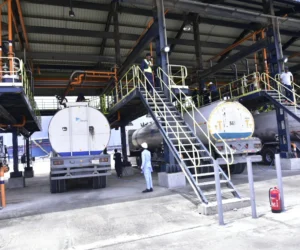In a country where the employment market is gradually getting saturated, skills acquisition is gradually being seen as a tool to create jobs and, at the same time, empower people, ultimately leading to poverty reduction; BENJAMIN UMUTEME writes.
Unemployment in developing countries often stems from a mismatch between the skills possessed by the work force and the demands of the job market. This is exacerbated by rapid population growth, limited formal education opportunities, and economic shifts.
Skills acquisition – the process of learning practical, job-relevant abilities through training, education, or hands-on experience – can directly address this by enhancing employability, fostering entrepreneurship, and boosting overall productivity.
According to the World Bank, skills acquisition reduces unemployment and underemployment while improving standards of living. By equipping individuals with skills, it enables them to access better job opportunities or create their own, ultimately contributing to sustainable economic development.
Skills acquisition is a powerful tool for tackling unemployment in developing countries by creating a more adaptable, productive workforce.
In Nigeria, there has not been a time that acquiring skills is no longer an option than now, especially with Nigerian universities producing about 500,000 graduates annually.
These days, you see young men and women, even teenagers learning various skills ranging from fashion designing, stylist, and culinary skills, POP design, plumbing, mason, just to name a few. All these cut across various sectors of the economy.
And this is the line of thought that is driving the Esther Matthew Tonlagha Foundation (EMT), when it organised a skills acquisition and empowerment programme in Warri, Delta state.
As part of its wider Niger Delta Youth Empowerment Programme, the Foundation gathered 36 men and women to learn cake-making, fashion design, makeup artistry, gele styling, culinary arts, and salon services.
They came from different walks of life – some unemployed, some underemployed, some mothers seeking to supplement household income, and others simply chasing their passion.
On graduation day, the air was filled with music, laughter, and the warm hum of pride. The graduates left not only with certificates in hand, but also with valuable start-up kits, cash grants, and – most importantly – the confidence to step boldly into the world of entrepreneurship.
Game-changer
Experts say the model Foundation adopts is not just unique, but remarkable due to its end-to-end approach. Training is only one part; the Foundation ensures graduates are equipped to start immediately.
In a country where many skill acquisition schemes end with a handshake and good luck, EMT’s inclusion of tools and seed funding is a game-changer.
For example, culinary graduates left with generators, deep freezers, ovens, 10kg cake mixers, 12.5kg gas cylinders, and ₦500,000 cash each. Cake & Event graduates received high-quality baking tools and event equipment, while make-up and gele-styling trainees walked away with professional kits, makeup chairs, lighting gear, lash machines, and ₦500,000 each.
Eight years of impact…and growing
Since its inception, EMT Foundation has trained and equipped dozens of people, constantly refining its approach. By combining skills training with practical start-up support, it removes the capital barrier that stops many small businesses before they start.
In a country where youth unemployment remains high and where many small businesses collapse due to underfunding, EMT’s model stands out. It doesn’t just ‘teach people to fish’ – it provides the fishing gear, maps the waters, and offers mentorship on how to make the catch profitable.
Experts have said that discipline, adaptability, humility, and passion will determine who thrives in the long run.
Creating wealth
The Founder of the programme, Mrs. Esther Matthew Tonlagha, urged the youth to put the skills they have acquired to productive use in order to create wealth for themselves, their families, and their communities.
Mrs. Tonlagha said the occasion was more than a celebration of certificates earned, but the “recognition of journeys undertaken, skills mastered, and futures transformed.”
According to her, “You have dedicated time, energy and heart to learning the art of culinary excellence, cake making, event planning and the cultural beauty of gele-styling. These are not just skills, but they are tools of empowerment; tools that can transform not only your own lives, but also the lives of those around you.”
She said, “You have chosen growth and with that choice, you have planted seeds of possibility. Whether you go on to start a business, support your family or teach others what you have learned, always remember your hands now carry the power to build something meaningful.
“This is just the beginning, keep learning and stay curious. Let your creativity flow. Do not be afraid to take up space, your talent deserves a place in the world.”
In his goodwill message, the Speaker of the Delta State House of Assembly, Emomotimi Dennis Guwor, said the event was not only a celebration of academic and vocational achievements, but also a “powerful expression of hope, dignity, social transformation and economic emancipation for the indigent and less privileged in society.”
Represented by Pastor Ambrose Omafuwe, Guwor said, “Over the years, EMT foundation has consistently demonstrated an unwavering commitment to empowering lives, building capacities and restoring communities through numerous philanthropic interventions ranging from infrastructural development, health care delivery, vocational training and empowerment programmes.”
Mrs. Judith Samuel, a culinary expert and trainer, who spoke with this newspaper in Jikwoyi, a suburb of the Federal Capital Territory (FCT), said acquiring a skill is a means of wealth-creation as well as reducing unemployment.
She noted that with skills, a lot of young people will be taken away from various forms of vice.
“Acquiring skills is good. When young people acquire one skill or another, it will help them to be engaged and not indulge in prostitution or get involved in yahoo.
“I learned a skill and it has helped me. Initially when I started, I didn’t have a shop but now I have a shop and I have people I am training. I have trained over 50 people. Some are in school and they are using the skill they learned to support themselves in school while others learnt and didn’t use it,” she said.
Commitment
Analysts have noted that many small businesses in Nigeria do not survive after the first year due to poor financial management; lack of adequate funding; inadequate market research; poor management skills; wrong business location; infrastructure challenges; and giving up easily among several other factors.
But the wife of the Presidential Amnesty Programme Administrator, Mrs. Ebimaboere Dennis Otuaro, urged them to be passionate about their business.
Mrs. Otuaro, who is also a farmer, said, “Be present, manage your capital, and adapt to customers’ needs. If you’re not ready to work, don’t take the slot – opportunities like this don’t come every day.
“I am a farmer. I sell rice. I have a poultry farm. There is no work I do that I don’t fully commit myself to. I go to my farm regularly even yesterday, when it was raining, I was there. It’s not because I lack food or comfort, I am fine, but my business gives me joy. It is something I love doing, not just because of the money. If you are in business only for the money, you won’t go far. If you allow pride to enter because you own a business, you won’t go far either.”
The Creative Director of Zion Cakes and Events, Mrs. Elozino Mamah, while urging the graduates to align passion with purpose, added that commitment will set their business apart.
“Choose a business you love so you can thrive. Every business solves a problem. Use social media – it’s where 90% of my clients come from. Start small; Rome wasn’t built in a day. Appreciate your clients, deliver quality, and present yourself professionally. Dress the way you want to be addressed,” she said.
Corroborating the earlier speakers, the CEO of Emomel Multi-Concept Investment, Blessing Pondi, shared her journey in the world of business. According to her, she started from selling 20 bags of rice in 2008 to running large-scale pig and poultry farms.
Pondi enjoined the graduates to make use of the opportunities available via social media to grow their businesses adding that a lot of businesses are doing very well with just online stores.
She explained, “If you can’t run a business with ₦200, 000, you won’t succeed with ₦500 million. That’s just the reality of life. Little by little, with encouragement from friends, “You can do it!” I kept pushing. By the grace of God, 17 years later, we have made some progress. We have not yet reached our final goal, but with God’s help, we will get there. Relationships can be a starting capital. And good behaviour is non-negotiable.”
“For your business to succeed, the first thing you must do is set aside your pride and ego. You must understand that business is not about beauty or appearance. Students, are you listening? Please respond so I know you understand. Beauty does not guarantee success in business.”








